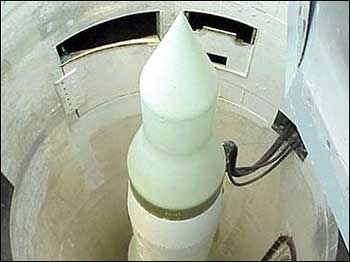 |
| Inside of deactivated Minuteman
II intercontinental ballistic missile silo in Wall,
South Dakota. (Photo: AP) |
(CBS/AP) The United States is cutting
its back-up supply of nuclear weapons while bolstering
its ability to build new and better bombs if necessary,
the Energy Department said Thursday.
"By 2012, the United States' nuclear
stockpile will be the smallest it has been in several
decades," National Nuclear Security Administration
administrator Linton Brooks said in a letter to Congress
presenting a classified report on the nation's nuclear
arsenal.
The changes to the nuclear stockpile follows
President Bush's commitment in 2001 to cut the number
of nuclear missiles deployed around the world to 1,700
to 2,200, a reduction of two-thirds. The stockpile is
the backup supply for operational missiles.
"The president's decision to reduce
the number of operationally deployed weapons has laid
the groundwork for a major reduction in the size of the
total nuclear stockpile," Brooks wrote. His unclassified
letter did not specify the size of the stockpile or the
proposed reduction.
According to The New York Times, Brooks
told a conference call with reporters the move would cut
the stockpile "almost in half." A weapons expert
at the Natural Resources Defense Council, Tom Cochran,
told The Times that the total nuclear arsenal would drop
from 10,000 weapons to 6,100 after the reductions announced
Thursday.
Even as it has looked to cut the active
nuclear arsenal, the Bush administration has also signaled
it is interested in developing the capability to build
newer, more advanced weapons.
One such weapon is the B-61-11
nuclear bunker buster.
Brook's letter indicated the reduced stockpile
would not derail those efforts; in fact, it might speed
them.
"We recognize that maintaining the
nation's nuclear deterrence with a much smaller stockpile
means that we must continue Administration efforts to
restore the nuclear weapons infrastructure," he wrote.
According to Brooks, those efforts include
planning a new facility for making the plutonium pits
in nuclear weapons, improving training for weapons scientists
and "enhanced test readiness.
The U.S. conducted its last nuclear test
in 1992. While the White House opposes the Comprehensive
Test Ban Treaty — which the U.S. has signed but not
ratified — the administration says it has no plans
to conduct a test.
Last summer, nuclear officials from several
agencies met for a meeting that included discussion of
the question: "What is the uncertainty in confidence
and potential risk threshold for a test recommendation—what
would demand a test?"
The administration has also pushed for
research on low-yield nuclear weapons and a bunker-busting
nuke called the Robust Nuclear Earth Penetrator.
A 2002 Nuclear Posture Review identified
Iraq, Iran, Syria, Libya, North Korea as countries where
"contingencies" could arise for which U.S. "nuclear
strike capabilities" must be prepared, according
to a leaked version.
- The Senate on Thursday agreed to ease
cleanup requirements for tanks holding millions of gallons
of highly radioactive waste from Cold War-era bomb making.
The provision allows the Energy Department to reclassify
radioactive sludge in 51 tanks at a South Carolina nuclear
site so it can be left in place and covered by concrete,
instead of being entombed in the Nevada desert. Senate
critics said the change would leave poisonous sludge
in underground tanks and risk contamination of groundwater.
- Federal environmental regulators have
rejected a government plan to begin removing highly
radioactive waste from a former uranium-processing plant
in Ohio. Nevada has threatened a lawsuit to block the
Energy Department from shipping the waste from the former
Fernald plant to the department's desert disposal site
65 miles north of Las Vegas. The Environmental Protection
Agency told the Energy Department on Tuesday that it
should not start removing the powdery waste from a concrete
silo later this month and then hold it at Fernald until
it could be shipped.
- Pakistan successfully test-fired a
medium-range, nuclear-capable missile Friday for the
second time in a week, but officials said the test was
not intended as a message to neighboring India's new
government.
- Prime Minister Abdullah Ahmad Badawi
said Friday that there was no need to let international
investigators interrogate the alleged chief financial
officer of a nuclear trafficking network arrested recently
in Malaysia. Malaysian officials
already have ruled out allowing U.S. officials to question
Buhary Syed Abu Tahir, saying they don't want any "foreign
intervention" in the case.
|